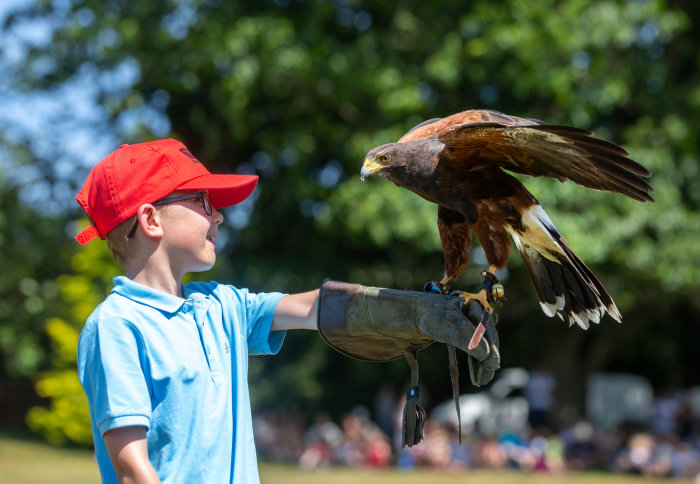Bugs! Day expands to include Birds and Beasts with roaring success

Imperial’s Silwood Park campus welcomed over 400 visitors to it’s expanded community outreach day.
Imperial College London’s Silwood Park, a picturesque 100-hectare satellite campus located in Ascot, welcomed over 400 visitors on the 24 July 2019, who got involved with science and activities ranging from pond dipping to face painting as part of the Bugs, Birds and Beasts! Day.
This year marked a twist to the usual Bugs! Day with the addition of Birds and Beasts. The aim of Bugs, Birds and Beasts Day is to help visitors engage with and discover the natural world through engaging activities and information stands.
This year’s event was organised by the Grand Challenges in Ecosystems and the Environment Initiative at Imperial and sponsored by the Genetics Society.

Insects are essential to life given their important roles such as in pollination, recycling nutrients in our soil and acting as a food source for both birds and beasts.
Bird displays and pond dipping
As part of the new birds display people were in awe of the flying ability of birds as a falcon swooped through the legs of six people during the falconry display.
 Inside the Jurassic Lab, there was a demonstration of the process of chick development. “The children are fascinated by the hatching chicks,” said Jack Murphy, an MSc Conservation Science student at the campus, while placing a chick egg with a window cut out of it to show chick development under a microscope.
Inside the Jurassic Lab, there was a demonstration of the process of chick development. “The children are fascinated by the hatching chicks,” said Jack Murphy, an MSc Conservation Science student at the campus, while placing a chick egg with a window cut out of it to show chick development under a microscope. Children discovered the local aquatic wildlife by ‘pond dipping’, where they scooped their nets through the small pond located behind the picturesque Manor House and inspected their findings in a tray, before excitedly going over to add the species they had found to the ever-growing list of species that had already been discovered in the pond.
Children discovered the local aquatic wildlife by ‘pond dipping’, where they scooped their nets through the small pond located behind the picturesque Manor House and inspected their findings in a tray, before excitedly going over to add the species they had found to the ever-growing list of species that had already been discovered in the pond.

Sean, an MSc Ecological Applications student at the campus, said that the children were mostly finding mayfly larvae, newts and damselflies. Pond dipping proved to be a highly popular activity for another year running, with many children saying it was their highlight of the day, listing every species of aquatic life that they had found in the pond.
Secret-recipe brownies and seed bombs
Tasty brownie bites were on offer throughout the day. However, although they looked like your typical brownie they were actually crafted with mealworm flour with crickets sprinkled on top. “The brownies are incredible,” said Meghan, while tucking into the insect treat, remarking how gooey and delicious they were and that she would never have known that they contained mealworms if she was not told.
Bugs, Birds and Beasts! Day attendees were able to get muddy and create seed bombs, a combination of clay, compost and wildflower seeds, to take home with them at the end of the day to help increase the flowers available for pollinators around their homes.
The compost offers nutrients for the seeds and the clay binds the seed bomb together so it can be launched over fences and into inaccessible areas. Eventually, the seeds will germinate and grow into flowers for pollinators, such as bees and butterflies.
Connecting with the community
Although an educational day, Bugs Birds and Beasts! Day also connects Silwood Park with the local community, with many members of the public remarking how it was great to finally see what was going on inside and look around the campus.
Butterfly Conservation were also there to promote and encourage people to take part in the Big Butterfly Count to increase the number of counts in the local area.
The day was a success: while being educational, it also inspired and provoked an interest in science among the children and their parents. This was made evident by one child asking their mum if they could come back again the next day!
Professor Vincent Savolainen, director of the Grand Challenges in Ecosystems and the Environment Initiative, said: "I am so pleased with the feedback we received, with 71% of attendees describing the event as 'awesome', and already planning to come back next year."
Article text (excluding photos or graphics) © Imperial College London.
Photos and graphics subject to third party copyright used with permission or © Imperial College London.
Reporter
Thomas Angus [Photographer]
Communications Division





